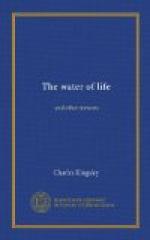From that, and from all adversities, may God deliver us, and our children after us, by graciously beholding this His Family, for which our Lord Jesus Christ was content to suffer death upon the Cross; and by pouring out His Spirit upon all estates of men in His holy Church, that every member of the same, in his calling and ministry, may freely and godly serve Him; till we have no longer the shame and sorrow of praying for English men and women, as we do for Jews, Turks, infidels, and heretics, that God would take from them all ignorance, hardness of heart, and contempt of His Word, and fetch them home to that flock of His, to which they all belong!
SERMON XX. THE GOD OF NATURE (Preached during a wet harvest.)
Psalm cxlvii. 7-9.
Sing unto the Lord with thanksgiving; sing praise upon the harp unto our God: who covereth the heaven with clouds, who prepareth rain for the earth, who maketh grass to grow upon the mountains. He giveth to the beast his food, and to the young ravens which cry.
There is no reason why those who wrote this Psalm, and the one which follows it, should have looked more cheerfully on the world about them than we have a right to do. The country and climate of Judea is not much superior to ours. If we suffer at times from excess of rain and wind, Judea suffers from excess of drought and sunshine. It suffers, too, at times, from that most terrible of earthly calamities, from which we are free—namely, from earthquakes. The sea, moreover, instead of being loved, as it is by us, as the highway of our commerce, and the producer of vast stores of food—the sea, I say, was almost feared by the old Jews, who were no sailors. They looked on it as a dangerous waste; and were thankful to God that, though the waves roared, He had set them a bound which they could not pass.
So that there is no reason why the old Jews should think and speak more cheerfully about the world than we here in England ought. They had, too, the same human afflictions, sicknesses, dangers, disappointments, losses and chastisements as we have. They had their full share of all the ills to which flesh is heir. Yet look, I beg you, at the cheerfulness of these two Psalms, the 147th and 148th. In truth, it is more than cheerfulness; it is joy, rejoicing which can only express itself in a song.
These Psalms are songs, to be sung to music, and even in our translation they are songs still, sounding like poetry, and not like prose.
And why is this? Because the men who wrote these Psalms had faith in God.
They trusted God. They saw that He was worthy of their trust. They saw that He was to be honoured, not merely for His boundless wisdom and His boundless power: for a being might have them, and yet make a bad use of them. But He was to be trusted, because He was a good God. He was to be honoured, not for anything which men might get out of Him (as the heathen fancied) by flattering Him, and begging of Him: but He was to be honoured for His own sake, for what He was in Himself—a just, merciful, kind, generous, magnanimous, and utterly noble and perfect, moral Being, worthy of all admiration, praise, honour, and glory.




